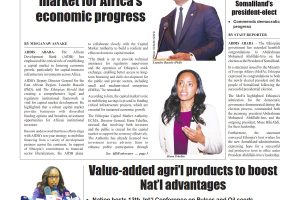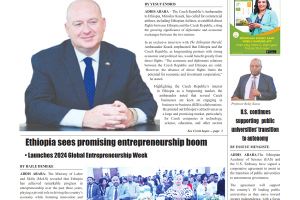
The demand for quality chemical products is integral to Ethiopia’s growth and daily life, pushing the nation to harness modern technology and machinery. The Chemical Industry Corporation Awash Melkassa Chemical Factory (CICAMCF) aims to elevate Ethiopia’s chemical and construction industries to a competitive global standard by 2025. Officials emphasize that stakeholder integration is key to advancing CICAMCF’s ambitions.
Ethiopian Investment Holding (EIH) Chemical’s Cluster Portfolio Director, Asema Redi, told The Ethiopian Herald that support from relevant bodies is crucial to fulfill the industry’s strategic goals and meet client demands. EIH oversees 31 public development institutions, including CICAMCF, and is responsible for ensuring that the domestic market is supplied with high-quality chemical products.
Under EIH’s management are several key projects, including Mugher Cement, Adami Tulu Tser-Tebay (anti-insect solutions), caustic soda production, and tire tree initiatives, which support essential sectors like manufacturing, water, and medicine. Additionally, domestically available inputs such as kaolin help mitigate foreign currency challenges.
CICAMCF currently produces sulfuric acid (H₂SO₄), aluminum sulfate (Al₂(SO₄)₃), and hydrogen peroxide (H₂O₂), but it operates at only 45% of its potential capacity. Asema noted that the factory has significant untapped capacity to meet local demand if adequately supported by strategic partnerships.
“Providing quality chemical products at reasonable prices is essential to meeting the needs of this sector,” Asema stated, adding that the EIH is committed to providing financial and technical assistance to modernize CICAMCF’s technology and machinery.
EIH’s Subsidiary Transformation Plan aims to support the chemical industry through new investments, supervisory roles, and attracting foreign investors. CICAMCF’s Manager, Ahmed Motuma, noted that despite being the only chemical producer in East Africa, challenges such as COVID-19, conflicts, and currency shortages caused production interruptions in 2019, leading some clients to seek alternatives abroad. However, CICAMCF has regained some of its clients through determined efforts.
Ahmed highlighted the importance of foreign currency allocations to the factory, enabling imports of sulfur and kaolin to scale up production. The factory plans to utilize 4,000 tons of locally sourced kaolin and import 800 tons of aluminum hydroxide to produce 1,600 tons of aluminum sulfate.
Last year, CICAMCF produced 1,120 tons of hydrogen peroxide, exceeding the national demand of 861 tons. Currently, CICAMCF is exploring export opportunities in neighboring markets to generate foreign currency revenue.
Bahir Dar Textile Manager, Mengestu Arega, stated that collaboration is essential to meet both domestic and international demand for quality chemicals. Mengestu urged the government to invite private sector investments to foster a world-class chemical industry in Ethiopia.
Addis Ababa Water and Sewerage Authority’s Water Quality Inspection Coordinator Zeleke Teferi echoed the call for cooperative efforts to bridge industry gaps. “We have sourced aluminum sulfate from CICAMCF since 1998, and though quality has improved, further collaboration is needed to close remaining gaps,” he advised.
BY MESERET BEHAILU
THE ETHIOPIAN HERALD TUESDAY 5 NOVEMBER 2024





